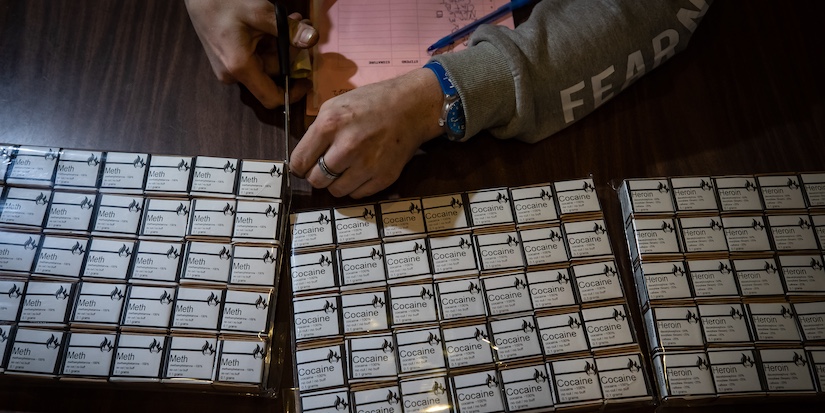Arts & Culture
Gender bending, dark comedy highlights South Asian side of Canadian culture
Published 4:26 PDT, Thu September 5, 2019
Last Updated: 1:36 PDT, Fri September 27, 2019
It’s a dark comedy about two guards debating whether to follow orders or not.
It’s a dark comedy about two guards debating whether to follow orders or not.
Sounds simple. But it’s not.
Of the play itself called “Guards at the Taj” The Chicago Tribune said, “Staring at beauty, pondering atrocities,” is not usually the making of a comedy. One of the two leads, Adele Noronha, describes it as a dark comedy.
Richmond’s Noronha, plays one of the two imperial guards, the night before the opening of the newly-finished Taj Mahal in 1653. The order? They are to amputate the hands of all who worked on this project, from labourers to architects, to prevent them ever making such beauty again.
When asked if this award-winning play by an equally award-winning playwright Rajiv Joseph, really has a male and a female soldier in it, she says no. They two characters are both men.
Why the gender-bending?
In an increasingly more common move, theatre companies cast women to play male roles. The director either changes the pronouns, as was done at Bard on the Beach’s newly-opened “Cariolanus” to make them women (click here to see our review https://richmondsentinel.ca/article-detail/2520/forget-the-action-movie-try-bard-on-the-beach) or leave the pronouns as written, with the women playing men. But why?
One reason for the gender swap, Noronha says is the lack of meaty roles for women.
“Traditionally in theatre, we are either the prize or the impediment.”
Noronha describes her time of playing her fair share of ingenues: “We tend to be passive, receptive characters. I do love those roles as well. There is something exciting about being to bring humanity to those faces as well.”
Bard on the Beach goers may remember Noronha as a strong member of a powerful cast in last year’s production of “Lysistrata,” another gender-transforming production.
In a new translation of this Greek comedy by Aristophanes, instead of all men, an all-women cast brought the classic play’s comedy to the forefront and strengthened the original biting political thread woven throughout the script. The fake battle, where the women mocked the men’s belligerence, was an absolute theatre gem.
“I had no intention of becoming an actor.”
The stage is not where Noronha expected to end up. While growing up in Richmond, she says, “I had no intention of becoming an actor.”
She had to choose an elective at Hugh Boyd Secondary. She had band, art and drama to choose among. She chose drama.
“I did have some wonderful teachers in high school who really cultivated my love for theatre and literature and the arts. I was given a lot of room to try things,” she says.
A well-rounded student, Noronha credits one Boyd teacher in particular for having an impact on her entire life. “I had a wonderful teacher in the Incentive Program, Mr. Dyck.”
She remembers a quote he passed on, “Never let your schooling get in the way of your education.”
“I have spent the rest of my life living by that,” she says.
“High school had me lean into the arts in a way I wouldn’t have done had I not been encouraged by teachers,” she says.
Noronha expresses gratitude for the learning she also did at Richmond’s Gateway Theatre School and later in Langara College’s Studio 58 acting program.
“I didn’t know the program was going to be as rigorous as it was. It caught me off guard and it’s a brilliant training program,” she says.
“I love the intergenerational people I worked with at Bard. Part of my growth in this industry has been working with some incredible artists and getting to watch them work.”
Noronha cites some examples, “Bernard Cuffling is so present. He’s always so present; it makes me so happy. Nicola Cavendish, just watching her work, is a master class on your feet.”
Calling her life as a working actor an extension of her training, Noronha says, “It’s something I am so grateful for. I have grown up because of the artists I work with.”
An up and coming producer with lots of experience
Then thoughts return to the upcoming production of “Guards at the Taj” which will be directed by Paneet Singh. Already an experienced producer in the South Asian community, Singh was apprentice director and creative cultural consultant for this summer’s Bollywood version of “All’s Well that Ends Well.” Having mainly worked in film and television, Singh’s reputation is also growing among those who enjoy live theatre.
Noronha says, “I have been dying to work with Paneet Singh. He has quite a following in the South Asian Community.”
Moving beyond casting South Asian Canadians in mainstream productions, “Gurads at the Taj” shows a culture that makes up our national history and identity. The history of South Asians in Canada, Noronha describes as, “One of those unseen realities.”
Of Singh who has already introduced South Asian culture into Bard on the Beach, Noronha says, “As he moves into the mainstream, I would absolutely keep an eye on his work.”
Saying the best directors, like Singh, are good facilitators, Noronha says, “He asks incredible questions.”
When asked about Singh’s decision to cast a woman as one of the two men in the play, Noronha says she gets to flex her acting muscles more. Had the play just been cast with two males in the lead, she says, “It would have been received as normal because that’s how people see the world.”
But, she cautions, she is taking the role seriously, “I am not playing this as a joke.”
She says she’s getting to flex her acting muscles and that contemporary audiences are much more flexible around gender.
And, she mentions another advantage to having a man’s role, “What’s wonderful about it, this is something with the most lines I have ever had.”
Of the upcoming play, a humorous look at a conversation between one soldier who is for the status quo no matter how horrible, and one who insists they need to instead pay attention to their personal morality, not just obey those in power, Noronha says, “I believe the revolution is joyful. That’s how we do it we remind people that there is joy in transformation.”
She notes that while keeping everything the same is comfortable, and change – even if it is ultimately for the better—makes people uncomfortable.
“That’s why it need to be playful.”
Looking back at her teachers, both in formal education and since becoming a working actor, Noronha says, “My profession as a professional is definitely down to what they equipped me with.”
This is a comedy, that introduces a part of history few non-Asian Canadians know, that has a strong woman playing a man, and that wrestles with issues of right and wrong.
“What I do love about this, especially at The Fringe, it is a playful risk. It allows us to stretch. And why not,” Noronha says with a smile.
Part of the Vancouver Fringe Festival, “The Guards at the Taj” is presented by South Asian Canadian Histories Association, and runs from Sept. 5 to 15 at the Vancity Culture Lab at The Cultch Theatre at 1895 Venables St. in Vancouver. Tickets, $12 plus the price of a Fringe Festival membership, are available at www.vancouverfringe.com.
The Vancouver Fringe is a celebration of all kinds of theatre. Produced annually by the Vancouver Fringe Theatre Society it runs over 11 days in September, with over 500 volunteers supporting 700 plus performances and attracting over 40,000 attendees. It is a chance to sample some of the finest, newest or wackiest productions around.






























